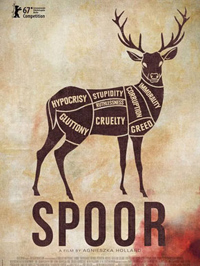Animal Love: Holland Blunders with Hysterical Murder Mystery
 What reveals itself to be an interesting inversion on parable of the boy who cried wolf, Polish auteur Agnieszka Holland delivers an otherwise leaden genre thriller with Spoor, a long gestating adaptation of the Olga Tokarczuk novel (on hand for the adaptation) Drive Your Plough Over the Bones of the Dead. Rife with specific regional flavor, including familiar historical shadings thanks not only to the phantoms of WWII but also the continual problem of patriarchal tendencies, Holland crafts an uneven discourse on the back of a character who veers between being unlikeable, unlikely, and sometimes uninteresting. Although this makes for a different kind of momentum in the usual flavors of these formulas (comparatively, this often nasty bit of pulp feels akin to the Nordic Noir staples of Stieg Larsson), by the time the who, what, when and where is revealed of the culprit killing a coterie of violent hunters in rural Poland, the narrative has unnecessarily outworn its welcome with a few too many hysterical outbursts and convoluted red herrings.
What reveals itself to be an interesting inversion on parable of the boy who cried wolf, Polish auteur Agnieszka Holland delivers an otherwise leaden genre thriller with Spoor, a long gestating adaptation of the Olga Tokarczuk novel (on hand for the adaptation) Drive Your Plough Over the Bones of the Dead. Rife with specific regional flavor, including familiar historical shadings thanks not only to the phantoms of WWII but also the continual problem of patriarchal tendencies, Holland crafts an uneven discourse on the back of a character who veers between being unlikeable, unlikely, and sometimes uninteresting. Although this makes for a different kind of momentum in the usual flavors of these formulas (comparatively, this often nasty bit of pulp feels akin to the Nordic Noir staples of Stieg Larsson), by the time the who, what, when and where is revealed of the culprit killing a coterie of violent hunters in rural Poland, the narrative has unnecessarily outworn its welcome with a few too many hysterical outbursts and convoluted red herrings.
A retired civil engineer who teaches English part time in a small Polish town close to the border of the Czech Republic, Ms. Duszejko (Agnieszka Mandat) has the reputation of an eccentric. Living on the extreme edge of the community with her two dogs, she is at odds with the town’s central ideals pertaining to hunting and the slaughter of animals by the town’s forefathers, a group of powerful men in a small town who refuse to live by the law of the land when it comes to hunting game. Despite her frequent complaints to the authorities, her voice remains unheard. Until her beloved dogs suddenly go missing, which leads Ms. Duszejko to search for them in vain. At the same time, the corpses of several prominent members of the community, all hunters, calls for a scapegoat to explain the crimes.
One of the many overtly insistent aspects of Spoor (which was also formerly known as Game Count, a phrase with a detrimental meaning in the finale) is a bombastic score from Antoni Lazarkiewicz, which is sufficiently moody but blared at every possible juncture, often to heighten a number of unwarranted sequences. Despite being a warm, likeable screen presence in the lead, character actress Agnieszka Mandat has the tendency to try the patience of the audience as much as a number of supporting characters—rather than root for her, Holland more often sabotages our sympathies. It’s one thing to have a character behaving with impassioned zeal to do what they believe is right, but quite another to show them as unreasonable, and (to repeat), hysterical.
Although an enemy of the trenchant patriarchal code, heavily informed by silly and archaic religious traditions, Ms. Duszejko (those constantly mispronouncing her surname or why she refuses to let anyone use her first name isn’t fully explained, but pronunciation and cultural heritage proves to be a subtext in several ways) is a frustrating character from the first act onwards, and feebly determined supporting characters (two age appropriate love interests, an indentured prostitute, and a police intern suffering from seizures) add to the artificiality of this dime store paperback quality.
Holland directs her leading lady similarly to a recent performance from Sidse Babett Knudsen in an equally overbearing style in La Fille de Brest from director Emmanuelle Bercot (which did score the actress a Cesar nod, however, so obviously many may have an affinity for this sort of high melodrama). There’s certainly an argument for these female characterizations so angrily at odds with their environments, even when their behavior frustratingly aids in their victimization rather than awarding agency (and, at least in the case of Duszejko, requires a trio of men to save her). But as far as mood, tone, and ambience, Spoor takes a progressive, liberal stance on animal rights and makes both sides so bleakly extremist it either provides its more gullible, non-questioning audience members with a clearly constructed diagram of who and what to cheer for, while others may be left merely with a cynical, bitter aftertaste from a narrative too quirky to take serious and too belabored to instill tension.
Reviewed on February 12 at the 2017 Berlin International Film Festival – Competition. 128 Mins.
★★/☆☆☆☆☆


